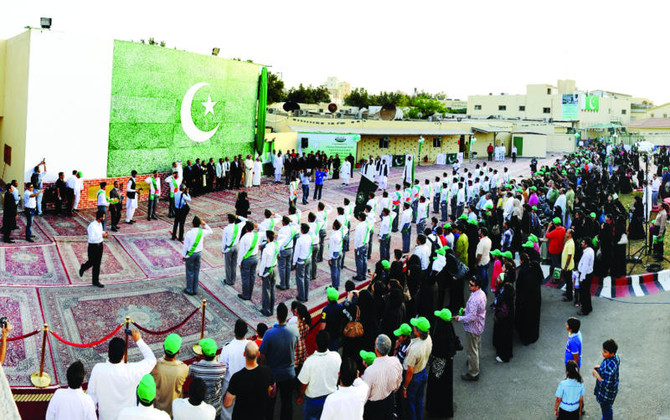The students and faculty members of Pakistan International School Jeddah — English Section, created history by forming the largest flag of Pakistan with thumb impressions. The large flag had 2.5 million thumb impressions.
The 78 square-meter flag was jointly unveiled by School Principal Sehar Kamran and Pakistan’s Ambassador Mohammed Naeem Khan at the PISJ-ES sports ground on Thursday.
A large number of Pakistanis attended the event. The flag-unveiling ceremony was followed by a parade by the PISJ-ES scouts.
Kamran said it was the largest flag of Pakistan created with thumb impressions and the claim has been registered with the Guinness World Records. She said the school was in the process of compiling evidence to qualify for the world Guinness title.
“Let us reaffirm our commitment to keep our flag flying high and work together for the prosperity, progress and sovereignty of Pakistan. Let us not forget and pay tribute to those who have struggled for the creation of our beloved homeland. Let us be proud of our heritage and identity,” she said.
Kamran prayed for the prosperity and progress of Saudi Arabia and for good health and long life of Custodian of the Two Holy Mosques King Abdullah.
Students of different classes performed on patriotic songs. Y-R students performed on Khayal Rakhna, Y-1 on Salaam Pakistan, Y-2 students on Chand Roshan Chamakta Sitaara Rahe followed by Wania Jibran’s performance on Chand Meri Zameen.
Ambassador Naeem Khan said, “I am indeed very happy to be here at the flag unveiling ceremony. I express my appreciation and congratulate PISJ-ES for the unique initiative undertaken… Thousands of people have contributed for this flag and I pray that it will be the largest flag and will Insha Allah be recorded in Guinness Book.”
He said, “Pakistani flag represents Pakistani people of all backgrounds and our thumb impressions show our commitment toward our homeland. Our country has given us so much…. We should be proud of our heritage and forefathers.”
Addressing the students the ambassador said he was optimistic the students of PISJ-ES would create new chapters for Pakistan and keep the flag of Pakistan flying high. He said the students were “Goodwill Ambassadors of Pakistan.”
Other guests included Consul General of Pakistan Aftab Khokhar, Editor in Chief of Urdu News Tariq Mishkhas and representatives of Pakistan Journalist Forum.
Tariq Mishkhas also participated in creating the flag by imprinting his thumb impression.























